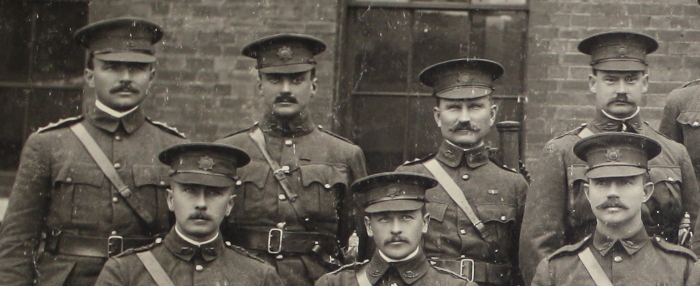Topic: Tradition

(An Excerpt From) Some Military Customs and Survivals
By Major T.J. Edwards, M.B.E., F.H.Hist.S.
Published in The Army Quarterly, Volume XXXIX, October 1939 and January 1940
 Moustaches
Moustaches
This may seem an odd subject to have any association with military matters, but, nevertheless, the growing or otherwise of moustaches by officers and soldiers had a definite relation to military fitness.
For purposes of personal hygiene all European armies usually removed as much hair as possible from their persons—heads were closely cropped and the face clean-shaven, thus rendering it impossible for disease-carrying vermin to get a footing. In the eighteenth century, however, we are told that the Austrians permitted their already blood-thirsty hussars to wear moustaches to give them a terrifying appearance. Apropos of this, Baron de Marbot, the well-known French military writer, records that the French General Macard used to say, "Look here!, I'm going to dress like a beast," and forthwith stripped off as much clothing as possible and went into action showing a shaggy head, face and body. Marbot also tells us that when he was a hussar in the 1790's the order was for all French hussars to wear moustaches for smartness and to give them a manly appearance. Those who could not grow moustaches had them painted on with blacking, which proved very unpleasant in hot weather, when the scorching sun in drying the blacking drew the skin up in a painful manner.
In The Times of the 21st of September, 1837, will be found the account of a young man who complained to a magistrate that he had been treated roughly by his workmates because he grew a moustache. Asked why he did so, he replied: "The reason vy I vears it is 'cos it's fashionable and makes me look like a man of some courage." (sic)
The practice of wearing moustaches in the British Army was fairly general after the Waterloo campaign, but in 1830 an order was issued prohibiting the wearing of moustaches in the cavalry, except the Household Cavalry and Hussar regiments. With the coming of the Crimean War another change took place, which was notified in a Memorandum from the Horse Guards dated the 21st of July, 1854, part of which ran:—"A large part of the Army being employed in Turkey, where it has been found beneficial to keep the upper lip unshaven and allow the moustache to grow, the General Commanding in Chief is pleased to authorize the practice in the army generally" subject to certain regulations; "the wearing of the moustache is to be optional with all ranks." After the Crimean War moustaches were no longer optional, but were ordered to be worn.
During the Great War the wearing of moustaches was optional, as it is at present. [British Army 1939/40]
The 1918 Standing Orders (for Officers) published by "A" Company, The Royal Canadian Regiment, included this insruction regarding moustaches:—
"R.C.R. Officers will not shave the upper lip."

